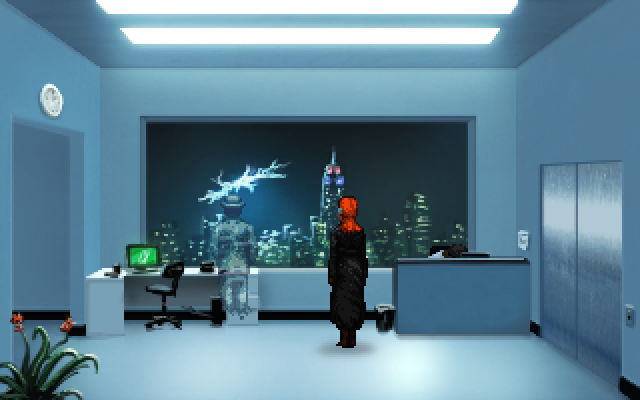
The Blackwell Epiphany
Written by: Rik
Date posted: January 8, 2019
- Genre: Adventure
- Developed by: Wadjet Eye Games
- Published by: Wadjet Eye Games
- Year released: 2014
- Our score: 9
The Blackwell series reached new heights with the fourth game, Deception, which successfully added a high-stakes finale to the solid storytelling and casework established and developed in previous titles. And so, we head into Rosa and Joey’s last stand, The Blackwell Epiphany, with some big expectations to meet: live up to the standards set by the previous game and provide a satisfying conclusion to the saga overall.
In the now-traditional opening mini-case/tutorial, Epiphany introduces a new working arrangement for our intrepid duo: employed in an extremely unofficial capacity by the NYPD (specifically, Blackwell and Shivah alumnus Detective Sam Durkin) to investigate any instances of strange goings-on, Rosa and Joey brave an unforgiving New York winter to poke around in an abandoned drug den. Following the resolution of that short but sad case, you’re immediately flung into the events of the main storyline, a combination of the usual investigation of lost spirits’ past lives and some additional sinister elements which were touched upon at the end of Deception.
Without deviating massively from the structure of previous games, there are signs from the outset that Epiphany intends to set itself apart. The bold new visual style, wintery weather and greater emphasis on outdoor locations all combine for a darker overall tone, and the story certainly follows suit. Without wanting to give too much away, I’d count at least 3 ‘holy shit!’ moments that genuinely caused an audible exclamation from me throughout the course of the game. These aren’t cheap or gratuitous shocks, and the fact that the series doesn’t usually deal in such things, as well as the skill with which they’re deployed, ensures their effectiveness.
Though lighter moments are in shorter supply, Epiphany isn’t entirely without levity: I particularly enjoyed Rosa’s back and forth with Detective Durkin, filling for time outside the police station while Joey takes a look inside, an acknowledgement of the strangeness inherent in one of Blackwell’s key mechanics: one character investigating requires the other to stand around near a doorway while doing and saying nothing.
Following the events of Deception, Rosa has fully embraced her status as Bestower, and goes about her business with a new sense of confidence and purpose. As you might expect, her relationship with Joey is by now stronger than ever: there’s the usual snippiness and banter, but there’s a real bond and affection between the two. At various points, we also travel back to the 1930s to meet Joey and other characters in a series of flashback sequences that fill in some longstanding backstory blanks.
Story-wise, there’s not too much more that can be said without spoilers, but it’s safe to say that Epiphany does a good job of tying up the loose ends and providing closure to the series while also being a damn fine tale in its own right. It’s comfortably the longest of the Blackwell games, retaining the core elements that make the series so enjoyable, but this time weaving a great number of individual cases into a coherent overarching story in a way that’s very satisfying, while reserving the ending itself for dealing with greater overall stakes and the fates of the series’ main characters.
At the risk of repeating myself, I think it’s worth saying again that Blackwell has always handled the sadness of its stories and some potentially tricky subject matter with a great deal of sensitivity. It’s a good job, too, because some of the very trickiest moments of the series occur in Epiphany, things that require skilful writing to navigate successfully. And, again, though most characters are encountered too briefly to be deeply layered with detailed backstories, each has some level of complexity that indicates they have been developed with thought and care, rather than serving some functional adventure game purpose.
I must admit that the first couple of times I played through Epiphany, my first instinct was to be slightly disappointed by the ending, for reasons that I won’t go into here (but I will stash away in a side-article marked SPOILERS, if you’re interested). It’s possible that some recurrent crashes and glitches affecting the endgame impacted my enjoyment somewhat (the first time I’ve ever had such problems with Blackwell, it has to be said), but there were certain things that didn’t quite sit right with me at first. I understand, though, that this ending is what writer Dave Gilbert had in mind all along, and in subsequent playthroughs I’ve come to understand and accept it. Credit, too, to the two main voice actors, Rebecca Whittaker as Rosa and Abe Goldfarb as Joey, who excel themselves in the finale as they have all series.
Glitches aside, the only other criticism that might be levelled at Epiphany is that those who demand hard puzzles are likely to be disappointed. Although, as noted, this is the lengthiest game in the series, it’s not the most challenging. There are even a couple of playful digs at adventure game logic, wherein a convoluted method of achieving something rather simple is eschewed in favour of the bleedin’ obvious. I’m personally in favour of a low difficulty setting when adventuring, although this may not be to everyone’s tastes. However, if you’ve come this far with the series, it’s unlikely to bother you much at this point.
Otherwise, the mechanics are sound, with the constant working and reworking of the notepad/smartphone/clue combination interface across the series once again bringing about an improvement overall. There’s also a fun innovation, introduced in the very first scenes, which allows Joey and Rosa to investigate different areas of a location separately, rather than automatically following each other everywhere unless Rosa specifically requires Joey to float through a locked door. If you need the main characters to be together, then there’s an option to call your colleague to your location (in a nice twist, when there’s no-one around, Rosa will call out to Joey but when there are other characters present, she switches to a whistle to prevent her looking too mad).
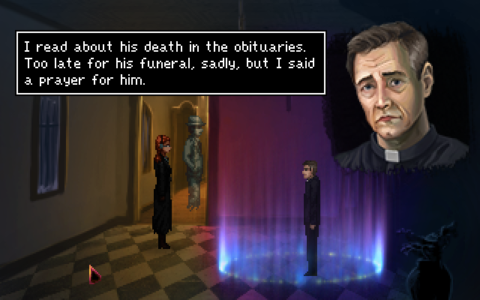
This man is called Michael and he’s standing in a circle that may or may not be magic [ok perhaps you’re going overboard on the bland, spoiler-free descriptions now – Ed.]
I’d have difficulty choosing between this final chapter and The Blackwell Deception as the overall high-point, but fortunately I don’t really have to. What’s certain is that the last two games are the best ones, and this is a series that starts well, gets better and goes out on a high. For those lapsed adventurers among you, I couldn’t recommend a better way to rediscover your love for the genre.

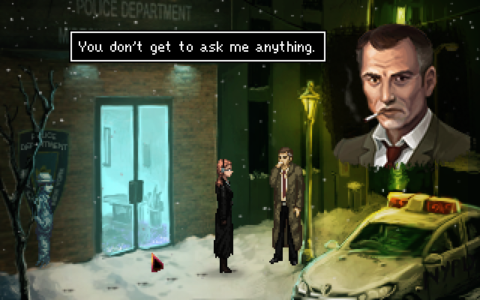
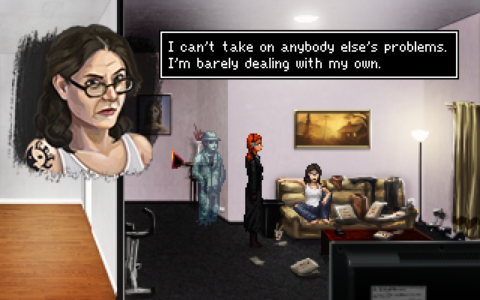
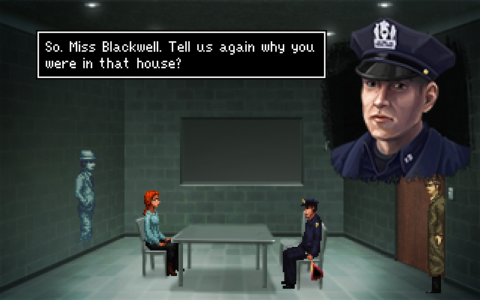

 Posts
Posts